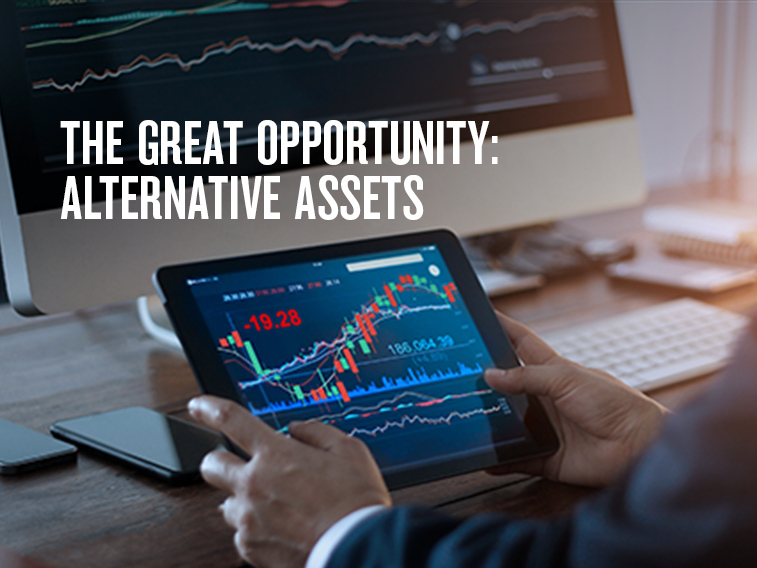Competition heats up for premium properties

Article
Australian investors have had largely overlooked alternatives. COVID-19 may well change that.

Australia’s high net worth investors have overlooked alternative assets by and large, instead favouring traditional shares and bonds. But COVID-19 and a recession might change all that – with good reason.
Why have Australia’s high net worth investors largely ignored alternative assets? It seems something of an oversight when you consider that investors from the United States, Europe and Asia have long sought them out – as have many of Australia’s institutional investors.
Take our largest superannuation funds, for instance – they tend to allocate a minimum of 25 to 30 per cent to alternatives, with some allocating close to 50 per cent.
For Gillian Gordon, JBWere’s Head of Alternative Investments, the relative absence of alternatives in Australian private wealth portfolios came as something of a surprise on her recent return from 14 years overseas. But she quickly realised it was the natural consequence of the country’s good fortune.
“Australia has experienced almost 29 years with no recession, the only G10 country not to go into a recession in the GFC, and that makes investor portfolios here very different,” Gordon says.
After all, when traditional asset classes, such as shares and bonds, have provided extremely healthy returns these past three decades, why look elsewhere?
In contrast, Gordon’s overseas’ clients were heavily impacted by the global financial crisis and therefore open to new solutions. “What I saw post the GFC was my overseas clients being really focused on risk and trying to understand why their portfolio took such a huge hit,” she explains. “They started looking for diversification and demanding a greater range of portfolio assets to mitigate this risk.”
In Australia, that simply didn’t happen.
Enter COVID-19. Gordon is convinced the subsequent market turmoil will be the impetus for change here because, as she puts it, “If investors weren’t looking at alternatives before, they definitely need to be looking at them now”.
For Gordon, this includes alternative strategies like hedge funds, which tend to be listed and focus on traditional asset classes. However, it also means non-traditional assets such as private equity, private debt, infrastructure, property, natural resources and renewables, which have long been a focus for the largest institutional investors but typically difficult for private wealth investors to access.
“Alternatives is such a wide-ranging and diverse asset class, meaning an alternative can play so many different roles in the portfolio,” she says. “The most obvious one is diversification, but it can provide low correlation to the traditional asset classes as well. Certain alternatives can also offer higher risk-adjusted returns.”
The current market dislocation could well lead to investment opportunities in the alternatives space; it just might not be obvious yet. That’s because many of these assets are unlisted, which makes them almost impossible to evaluate in the here and now.
“Public market asset pricing can be seen in real time. But for private market assets that is not the case – there is typically a valuation lag and data is not as transparent or accessible” Gordon explains.
In any case, alternatives aren’t simply a short-term opportunity or solution to the current market volatility. Rather, they play into the big, long-term trends that Gordon sees ahead. She points to the rise of urbanisation and Asia’s middle class, the growth of technology and big data, and the pressing challenges of climate change and the environment. All of these thematics will require funding that goes beyond the scope of the public markets.
“If you want your portfolio to have access to the full market, then that isn’t simply the public market. It’s actually the public and the private market.”
Of course, not everyone is comfortable with jumping into the private market, and many of these opportunities are beyond the reach of your average high net worth individual.
Those considering incorporating alternatives into their portfolio for the first time might like to start with the familiar. “You can start with investing into something that looks and feels quite similar to what you’re used to, something quite liquid and listed,” Gordon says.
On the other hand, if you can tolerate some illiquidity in your portfolio, she recommends considering the full spectrum of alternative assets.
In order to find the right fund manager, though, you’ll first need to find the right wealth manager – particularly in the current climate. “That’s the key to all of this,” Gordon says. In her opinion, it’s critical you examine any fund manager’s skills and track record, as well as their experience in managing assets through a crisis.
And while Australia may have some top-quality, top-quartile fund managers, she strongly suggests that investors also look further afield. “Australia is such a small component of the global alternatives investment universe – it accounts for less than three per cent of the almost US$11 trillion universe. If you want a portfolio that truly reflects the market, you need to think about investing both locally and globally.”
That calls for a wealth manager with the size, scale and ability to access these investments. But such investments don’t come cheap. As Gordon points out, they usually require a minimum ticket size of US$5 to US$10 million, which means most individual investors will need JBWere to aggregate their demand together with other clients.
Says Gordon: “There’s no reason why private wealth clients can’t access the types of alternative investments that super funds can access. It’s our job to provide clients world-class access to these opportunities.”
Those investors who are interested can approach JBWere direct. Otherwise, NAB’s Global Investment Desk can introduce them to the wealth manager for further assistance.
© National Australia Bank Limited. ABN 12 004 044 937 AFSL and Australian Credit Licence 230686.